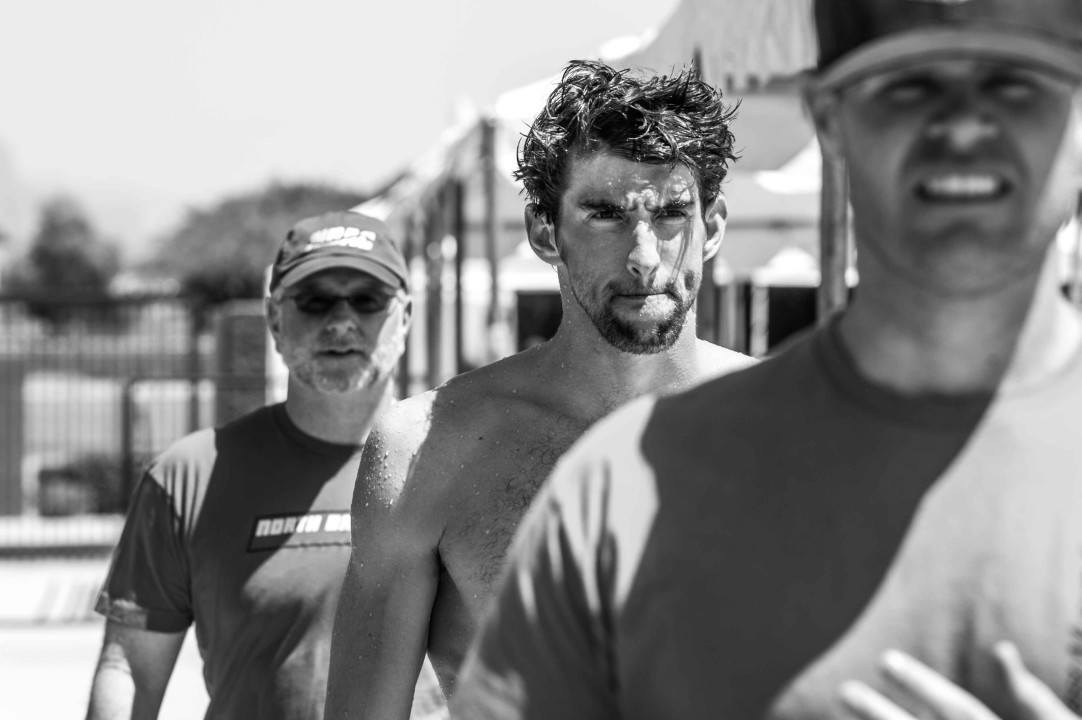Courtesy of and written by Chad Castillo – A.K.A “Coach C.” Read more of Chad’s Work at SwimCoach.org.
Sitting in 110 degree heat on a pool deck 100 miles from home you see a swimmer that hasn’t said a word to you all day get behind the blocks and prepare to race. You don’t know how much they warmed up for the event or if they warmed up at all. You know that the athlete’s stroke is great after a quick reminder of what to think about, but if the reminder isn’t there, they unleash a fury of haymakers on the water instead of what you would call freestyle. You want to yell across the pool to the swimmer but the whistles have already blown. It’s too late. You sit back with your stopwatch and hope for the best.
The race is over, and the swimmer was 1 tenth away from the qualifying time they were shooting for. What hurts even more is that if this swimmer had earned their time they would have significantly helped the team at the championship meet. One small reminder could have been the difference. You sit and wait for the athlete to cry on your shoulder but you see them saunter by the coaches table without a care in the world. Did the swimmer know their time? Do they know what their swim could have meant for the team?
You want to grab the athlete by the goggles and scream about how irresponsible they are, or how they need to plan their race timeline better. It’s all the swimmers fault! But hold on there coach . . . Who’s fault is it really?
As I’m sure you preach daily, every athlete’s success or failure begins at practice. In my humble opinion EVERY aspect of their race begins at practice. From warmup, to hydration, to race strategy; If an athlete is expected to perform certain responsibilities at a meet those responsibilities should be introduced and repeated in practice. Who plans practice? See where I am going here?
Before chewing out your athlete for their lack of preparedness go back and think, did the athlete know how to prepare themselves? Did you show them as coach? Practice it with them? Provide feedback and practice again after they messed up the first time? Second time? Did you remind the athlete a few months after you introduced the concept?
If you did, then chew away! If not, you as coach need to prepare your athletes better…. not the other way around.
Why athletes need to talk to coach before and after their race
Speaking with the coach before and after every event is a critical part of an athlete’s development and overall success. Some of the benefits of speaking with coach are:
- Routine: It gives the athlete a “routine” that they perform before every race. This practiced routine gets the athlete focused and in a state that they have experienced before. Small meet or Big meet, the routine is the same.
- Time Management: A life skill that most successful people we know have. Speaking with coach before an event forces the athlete to manage their time at a meet. Teaching them an invaluable life skill in the process.
- Race & Stroke Cues: The athlete can be reminded of race strategy, technique ques, heat/lane assignment, heat speed and strategy along with many other topics that help the athlete perform their best in the event.
- Learning: When an athlete gets feedback immediately after a race they learn. If they did well or poorly they learn why. Some of the best teaching/coaching can be done after a race. The athlete has to come up tho!
Strategies to help make getting feedback from coach a part of your team’s culture
Before the Meet
- Front load it: As always tell the kids WHY you are asking them to come and speak with you. Tell them a story to help keep their attention (Maybe the wonderful story from my intro?). Nobody wants to fail. If speaking with coach is presented as a way to help athletes excel, a behavior change is more likely to happen.
- Race day practice once a month: Incorporate a “meet style” practice or time trial once a month on a day that you were planning to go fast. Ask the athletes to come talk to coach before their event. This doesn’t have to be long. Maybe just a check in with the coach to get the athlete used to the idea.
During the Meet
- Remind athletes in team meeting: Remind the athletes of your expectations during the team meeting before the meet. Remind them WHY the behavior is so important.
- Make it a competition: If everyone from a certain age group; gender; or stroke comes up to talk with coach (before AND after) then that group will get a prize. Ex. Writing workout for a day; Get out of practice early; Get out of morning practice; Bought a gift (If money allows)
- Reward Individuals: Give athletes praise for doing the right thing. Have some gift cards or some sort of item ready to hand out to athletes if they come up and talk to the coaches. It could be a random gift or something given to every athlete. (Treats work great with 8 and unders)
An athlete’s preparedness does not happen by chance. It is ultimately the coaches responsibility to inform, practice, and provide feedback so that the athlete is successful.
Please let me know if you have any other strategies that help you.
Courtesy of and written by Chad Castillo
AB

Fantastic discussion!
Prepare the way you intend to perform.
I sure hope the guy who was my college coach reads this.